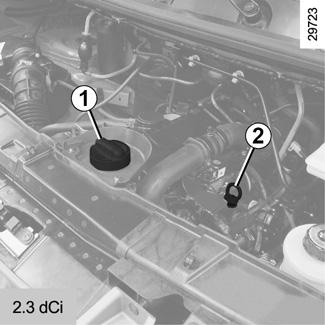To find the right engine oil grade for your Renault Trafic, refer to the manufacturer’s manual. It will specify the exact oil type recommended for your vehicle.
Choosing the correct oil grade is crucial for maintaining optimal engine performance and longevity. By using the recommended oil, you ensure proper lubrication and protection for your engine, ultimately enhancing its efficiency and durability. Whether you have a diesel or petrol Renault Trafic, selecting the appropriate engine oil grade is essential for the smooth operation of your vehicle.
Consult the manual or contact a professional to determine the suitable oil grade for your Renault Trafic.
Introduction To Renault Trafic Engine Oil
Discovering the right engine oil type for your Renault Trafic can be a daunting task. It’s essential to find the right oil grade to ensure your vehicle runs smoothly and safely. By using the BIZOL Oil Guide or consulting with a trusted mechanic, you can determine the correct oil type for your Renault Trafic.
Renault Trafic is a popular light commercial van known for its reliability and versatility. To keep your Trafic running smoothly, it is essential to choose the right engine oil. With so many options available in the market, it can be daunting to find the right oil grade for your vehicle. In this post, we will guide you through the key factors that influence oil selection and help you find the right oil grade for your Renault Trafic.
Importance Of The Right Oil For Your Renault Trafic
Choosing the right engine oil for your Renault Trafic is crucial to keep it running smoothly and efficiently. The engine oil lubricates the moving parts of the engine and prevents friction, which can cause wear and tear over time. Using the wrong oil grade or low-quality oil can lead to engine damage, reduced performance, and increased fuel consumption. Therefore, it is essential to use the right oil grade recommended by the manufacturer to ensure optimal engine performance and longevity.
Key Factors Influencing Oil Selection
There are several factors to consider when selecting the right engine oil for your Renault Trafic. These include:
- Oil viscosity: The viscosity grade of the oil determines its flow rate and thickness. The recommended viscosity grade for your Trafic depends on the engine type, driving conditions, and climate. Using the wrong viscosity grade can lead to engine damage and reduced performance.
- Oil type: There are two types of engine oils: mineral and synthetic. Mineral oils are made from crude oil and are suitable for older engines with low mileage. Synthetic oils are formulated for modern engines and offer better performance, fuel efficiency, and engine protection.
- Oil additives: Engine oils contain additives that enhance their performance and protect the engine from wear and tear. These additives include detergents, dispersants, anti-wear agents, and friction modifiers. Choosing an oil with the right additives can improve engine performance and reduce maintenance costs.
- Oil certification: The American Petroleum Institute (API) and the European Automobile Manufacturers Association (ACEA) certify engine oils based on their performance and compatibility with different engine types. Choosing an oil that meets the API and ACEA standards ensures optimal engine protection and performance.
In conclusion, selecting the right engine oil for your Renault Trafic is crucial for optimal engine performance and longevity. By considering the key factors that influence oil selection, you can find the right oil grade and type that meets your vehicle’s needs. Always follow the manufacturer’s recommendations and ensure that the oil you choose meets the necessary certifications and standards.

Credit: gb.e-guide.renault.com
Viscosity Grades And What They Mean
Understanding viscosity grades is crucial for selecting the right engine oil for your Renault Trafic. These grades, typically indicated on oil containers, reflect the oil’s flow resistance. To ensure optimal performance, always choose the recommended viscosity grade for your vehicle’s engine.
Understanding Viscosity In Engine Oils
When it comes to choosing the right engine oil for your Renault Trafic, understanding viscosity grades is essential. Viscosity refers to the oil’s resistance to flow at different temperatures. It plays a crucial role in maintaining optimal engine performance and protection.
Decoding The Numbers: The Significance Of Oil Grades
Oil grades are denoted by a combination of numbers and letters, such as 5W-30 or 10W-40. Let’s break down what these numbers mean and how they impact your Renault Trafic’s engine:
- The first number (e.g., 5W or 10W) indicates the oil’s viscosity at low temperatures. The lower the number, the better the oil flows in cold weather. This is crucial for easy engine startup and protection during cold starts.
- The letter (e.g., W) stands for winter, indicating that the oil meets specific requirements for cold weather performance.
- The second number (e.g., 30 or 40) represents the oil’s viscosity at operating temperature. Higher numbers indicate thicker oil, providing better protection under high engine temperatures.
It’s important to note that manufacturers recommend specific oil grades for different engine types and operating conditions. Using the wrong viscosity grade can lead to engine damage or poor performance.
To find the recommended oil grade for your Renault Trafic, refer to the owner’s manual or consult with a trusted mechanic. They will consider factors such as the engine type, climate, and driving conditions to determine the ideal viscosity grade for your vehicle.
By choosing the correct viscosity grade, you can ensure that your Renault Trafic’s engine receives the optimal lubrication and protection it needs to perform at its best.
Specific Oil Requirements For Renault Trafic
Choosing the right engine oil for your Renault Trafic is crucial to ensure optimal performance and longevity of your vehicle. It’s important to understand the specific oil requirements and compatibility with diesel and petrol engines to keep your Trafic running smoothly.
Renault Trafic Oil Specifications
Renault Trafic requires engine oil that meets the specific ACEA (Association des Constructeurs Européens d’Automobiles) and API (American Petroleum Institute) specifications. The recommended oil grade for Renault Trafic is ACEA C3 or API SN for petrol engines and ACEA C3 or API CJ-4 for diesel engines.
Compatibility With Diesel And Petrol Engines
The engine oil chosen for Renault Trafic must be compatible with both diesel and petrol engines. It’s essential to ensure that the selected oil grade provides adequate lubrication and protection for the different engine types to maintain their performance and efficiency.

Credit: www.ebay.com
Synthetic Vs. Conventional Oils
Looking for the right oil grade for your Renault Trafic engine? Understanding the difference between synthetic and conventional oils can help you make an informed decision. Synthetic oils offer better performance and protection, while conventional oils are more cost-effective. Consider your vehicle’s needs and consult your owner’s manual to find the right oil grade for optimal performance.
Benefits Of Synthetic Oils For Renault Trafic
Synthetic oils have gained popularity in recent years due to their numerous advantages over conventional oils. If you own a Renault Trafic, choosing the right engine oil is crucial for maintaining the performance and longevity of your vehicle. Synthetic oils offer several benefits that make them an excellent choice for your Renault Trafic.
- Improved Engine Protection: Synthetic oils have a higher viscosity index, meaning they maintain their thickness across a wider temperature range. This ensures optimal lubrication and protection for your Renault Trafic engine, even in extreme conditions.
- Enhanced Fuel Efficiency: Synthetic oils reduce friction and improve engine efficiency, resulting in better fuel economy. With the rising fuel costs, using synthetic oils can help you save money in the long run.
- Extended Oil Change Intervals: Synthetic oils have a longer lifespan compared to conventional oils. They can withstand higher temperatures and maintain their properties for a more extended period. This allows for longer oil change intervals, reducing maintenance costs and hassle.
- Better Cold Start Performance: Synthetic oils flow more easily at low temperatures, ensuring faster lubrication during cold starts. This reduces engine wear and tear, especially during winter months.
- Reduced Engine Deposits: Synthetic oils have superior detergent properties that help prevent the formation of sludge and deposits in the engine. This leads to cleaner internal components and improved engine performance.
When To Choose Conventional Oils
While synthetic oils offer numerous advantages, there may be situations where conventional oils are more suitable for your Renault Trafic. Here are a few instances when conventional oils may be the preferred choice:
- Older Vehicles: If you own an older Renault Trafic with high mileage, conventional oils may be more compatible with its engine design and tolerances.
- Severe Driving Conditions: In certain extreme conditions such as off-roading or towing heavy loads, conventional oils may provide better protection due to their higher viscosity.
- Budget Constraints: Synthetic oils are generally more expensive than conventional oils. If you’re on a tight budget, conventional oils can be a more cost-effective option.
- Manufacturer Recommendations: Some vehicle manufacturers recommend specific oil types or grades for their models. Always refer to your Renault Trafic’s owner manual or consult with a professional to ensure you’re using the oil type recommended by the manufacturer.
In conclusion, synthetic oils offer several benefits for your Renault Trafic, including improved engine protection, enhanced fuel efficiency, extended oil change intervals, better cold start performance, and reduced engine deposits. However, there may be instances where conventional oils are more suitable, such as with older vehicles, severe driving conditions, budget constraints, or manufacturer recommendations. Ultimately, the choice between synthetic and conventional oils depends on your specific needs and circumstances.
Top Recommended Oils For Renault Trafic
When it comes to selecting the right engine oil for your Renault Trafic, choosing a quality product is essential for optimal performance and longevity. Below are some of the top recommended oils for your Renault Trafic:
Brand Recommendations: Castrol
- Pros: Trusted brand, high-quality formulation
- Cons: Can be slightly more expensive
Brand Recommendations: Shell
- Pros: Well-known brand, excellent engine protection
- Cons: May not be budget-friendly for some users
How To Check And Replace Engine Oil
Ensure your Renault Trafic runs smoothly by checking and replacing the engine oil regularly. Look for the recommended oil grade in the owner’s manual and use a dipstick to check the oil level. If it’s low or dirty, replace it with the appropriate oil type to maintain optimal engine performance.
Introduction: Checking and replacing engine oil is an essential part of maintaining your Renault Trafic’s engine health. It’s crucial to use the right oil grade to ensure optimal performance. In this article, we will guide you through the process of checking and replacing your Renault Trafic’s engine oil and help you find the right oil grade for your vehicle. Step-by-step guide on checking oil level: Checking your Renault Trafic’s engine oil level is a simple process that should be done regularly. Here’s a step-by-step guide on how to check the oil level: 1. Make sure your engine is cold and parked on a level surface. 2. Open the hood and locate the oil dipstick. 3. Pull out the dipstick and wipe it clean with a cloth. 4. Insert the dipstick back into the engine and pull it out again. 5. Check the oil level on the dipstick. It should be between the minimum and maximum marks. 6. If the oil level is below the minimum mark, add the recommended oil grade until it reaches the maximum mark. Changing the engine oil: Best practices Changing your Renault Trafic’s engine oil is a vital part of keeping your engine running smoothly. Here are some best practices to follow when changing your engine oil: 1. Make sure your engine is warm but not hot when changing the oil. Warm oil flows more freely, making it easier to drain. 2. Use a suitable oil drain pan to catch the old oil and dispose of it properly. 3. Remove the oil filter and replace it with a new one. 4. Refill the engine with the recommended oil grade, using the correct amount. 5. Start the engine and let it run for a few minutes to circulate the new oil. 6. Turn off the engine and recheck the oil level using the dipstick. 7. Dispose of the old oil and oil filter at a certified disposal facility. Conclusion: By following these simple steps, you can ensure that your Renault Trafic’s engine oil is at the correct level and grade for optimal performance. Regularly checking and replacing your engine oil is an essential part of maintaining your vehicle’s engine health, and it’s crucial to use the recommended oil grade. By doing so, you can ensure that your Renault Trafic runs smoothly and efficiently for years to come.
Understanding Oil Change Intervals
Understanding oil change intervals is crucial for maintaining the performance and longevity of your Renault Trafic engine. To find the right oil grade for your vehicle, consider factors such as the manufacturer’s recommendations, viscosity grade, and the specific needs of your engine.
By choosing the correct oil, you can ensure optimal engine performance and protection.
Optimal Frequency For Oil Changes
Understanding the optimal frequency for oil changes is crucial for maintaining the performance and longevity of your Renault Trafic engine. By adhering to the recommended oil change intervals, you can ensure that your vehicle operates efficiently and experiences minimal wear and tear.
Factors Affecting Oil Change Timing
Several factors influence the timing of oil changes for your Renault Trafic. These include driving conditions, vehicle age, manufacturer recommendations, and the type of oil used. By considering these factors, you can determine the most appropriate interval for changing the engine oil to keep your Renault Trafic in top condition.

Credit: www.ebay.com
Additional Tips For Engine Oil Maintenance
When it comes to maintaining your Renault Trafic’s engine, it’s crucial to stay on top of oil maintenance. In addition to choosing the right oil grade, there are several important considerations for engine oil maintenance that can help ensure the optimal performance and longevity of your vehicle.
Dealing With Oil Leaks And Consumption Issues
If you notice any signs of oil leaks or excessive oil consumption, it’s essential to address these issues promptly. Check for any visible leaks under the vehicle and monitor the oil level regularly to identify any abnormal consumption patterns. Addressing these issues early can prevent potential damage to the engine and ensure efficient oil usage.
Importance Of Regular Maintenance Checks
Regular maintenance checks play a significant role in ensuring the health of your Renault Trafic’s engine. Schedule routine inspections with a qualified mechanic to assess the oil condition, filter status, and overall engine health. By staying proactive with maintenance, you can detect any potential issues early and take necessary actions to maintain the engine’s performance.
Frequently Asked Questions
What Oil Do I Put In My Renault Trafic?
For your Renault Trafic, the engine oil type will depend on whether you have a diesel or petrol engine. Consult your owner’s manual for the exact grade and viscosity, or check with a trusted mechanic. Some recommended brands include Castrol, Shell, and BIZOL.
It’s important to use the right oil to ensure your vehicle runs smoothly and safely.
What Kind Of Oil Does A 2014 Renault Trafic Take?
The 2014 Renault Trafic takes engine oil suitable for diesel and petrol engines. It’s recommended to use the correct oil grade specified in the vehicle’s manual.
What Kind Of Oil Does A 2006 Renault Trafic Take?
The 2006 Renault Trafic takes engine oil suitable for diesel and petrol engines. Check the manufacturer’s recommendations for the correct oil grade.
How Do I Choose My Engine Oil Grade?
To choose your engine oil grade, check your car manual for the recommended viscosity grade based on your vehicle’s specifications.
Conclusion
Choosing the right engine oil grade for your Renault Trafic is crucial for optimal performance. By considering the manufacturer’s recommendations and understanding your vehicle’s specific needs, you can ensure smooth operation and longevity. Remember, regular oil changes are key to maintaining your Renault Trafic’s engine health.


